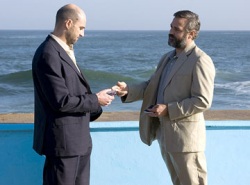Syriana
 The August issue of Believer magazine has an engaging interview with director Steven Soderbergh, and it crystalized something that’s been troubling me about two movies widely praised for their uncompromising complexity: Caché and Stephen Gaghan’s Syriana.
The August issue of Believer magazine has an engaging interview with director Steven Soderbergh, and it crystalized something that’s been troubling me about two movies widely praised for their uncompromising complexity: Caché and Stephen Gaghan’s Syriana.
In the interview (which I found through GreenCine Daily), Soderbergh says:
“[T]he hardest thing in the world is to be good and clear when creating anything. It’s the hardest thing in the world. It’s really easy to be obscure and elliptical, and so fucking hard to be good and clear. It breaks people. Because you don’t often get encouragement to do that, to be good and clear.”
The irony is that Soderbergh was an executive producer of Syriana.
The film’s subject makes it bluntly political, yet Syriana nearly demands multiple viewings to even understand its plot, let alone its meanings. It is intended to illuminate that the business of oil is a dirty one, yet even people who pay close attention to the movie will come away from it more confused than enlightened. To cite just one example: What, exactly, was George Clooney’s character trying to do at the end? I’m not sure, but the fact that I’m more consumed with that question than with what Gaghan has to say makes the movie a failure.
Gaghan plops the audience into the story with virtually no introduction or exposition. While this is welcome on one level, because clumsy exposition is downright painful, it ignores that exposition done well is elegant and unobtrusive, conveying information without sacrificing relative realism. In Syriana, the audience must work hard to figure out plot mechanics, character context, relationships, and even basic motivations. And a lot of the time, they’re just guesses.
Compounding the problem, the movie is not merely not clear. It is willfully difficult and disorienting, as if Gaghan believed that only by re-watching the film could somebody comprehend the nuanced insights that the writer/director brought to the project. Less charitably, Gaghan is mocking viewers, like a person who uses a six-syllable word when a less-sophisticated one would do: You’re not worthy of my genius.
If the topic of Syriana is so important, why not make every effort to make it clear, to help the audience along?
I’m not suggesting that Syriana ought to have been more simple. Ambiguity is far too rare in movies, and in character dramas and horror pictures, especially, it should be celebrated. Syriana’s difficulty is problematic because the movie obviously wants to be didactic, and it’s unnecessarily coy.
The challenge, of course, is that it’s typically not obvious where the line between clarity and dumbing-down lies. Soderbergh and Gaghan previously collaborated on Traffic – the former directed the latter’s screenplay – and it had a peculiar lucidity. The movie cut the superior British miniseries in half and employed the silly trick of color-coding different plot strands through cinematography; if it’s gold, it must be Mexico.
The effect was a movie that didn’t trust its audience. And considering that Traffic merely wanted to show how drugs are bad – up and down the line – that was a gross miscalculation. A little more difficulty would have been appropriate.
Like Traffic, Syriana has a big, serious, dry, and incendiary topic, a large canvas, and a hint of humanity. But it’s a better movie, constructed as a thriller and pretty good at it. It most resembles The Constant Gardener, particularly in the way it fosters righteous indignation about a fiction.
The key difference between the two is that Syriana feels more authentic and grounded, because most of us already know or believe that mountains get moved – legally or otherwise – for the oil industry.
But while I prefer Syriana to Traffic or The Constant Gardener, I don’t believe it’s a good movie. Noble? Certainly. Well-crafted? Absolutely. A pain in the ass for no apparent reason? Oh, yes.
I keep returning to one particular scene as a contrast. It involves an essentially random tragedy that exists almost exclusively as a device to re-situate Matt Damon in the world, and it’s presented so artlessly, and with such blunt force, that it seems to belong to another movie. The sequence is clunky in the way it’s set up and then redundant in its execution.
It’s terrible storytelling, but at least it’s trying to serve the audience. Gaghan, in this one bit, is attempting to generate some suspense, but he’s also trying to be clear about what’s happening. He wants the viewer to understand what’s going on.
So we’re beaten over the head that a kid was electrocuted in a pool. But what the fuck was Clooney doing chasing down that caravan?

